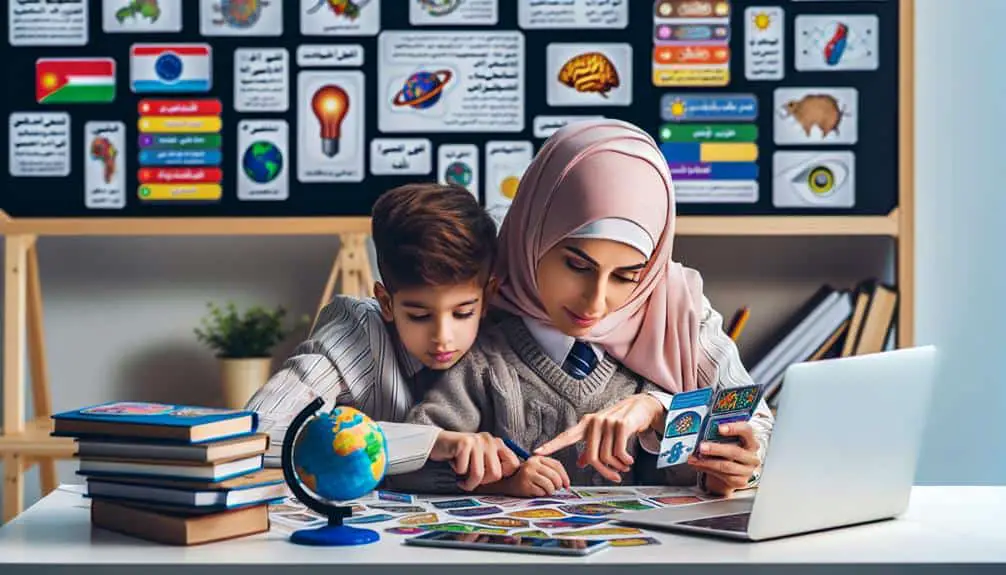In homeschooling, reflective practice is crucial. It helps you analyze teaching methods effectively, leading to improved learning outcomes for both you and your child. By reflecting on your approach, you can make adjustments that cater to your child's individual needs and learning style, creating a more engaging and effective learning environment. This practice fosters a continuous cycle of improvement, where you can adapt and enhance your teaching techniques based on your experiences. Embracing reflective strategies in homeschooling guarantees a more personalized and enriching educational journey for you and your child. Discover more ways to enhance your homeschooling experience.
Key Points
- Reflective practice encourages critical analysis for effective teaching methods.
- Self-evaluation aids in assessing and improving homeschooling outcomes.
- A growth mindset helps in adapting teaching techniques to enhance learning.
- Adjustments based on reflective strategies optimize the homeschooling journey.
- Continuous improvement through reflection benefits both parent and child.
Understanding Homeschool Learning Styles
Understanding homeschool learning styles can greatly enhance your ability to tailor educational approaches to meet your child's unique needs and preferences. When it comes to visual learners, incorporating a hands-on approach can greatly boost their comprehension and retention. Visual learners thrive when information is presented in a visual format, such as graphs, diagrams, or images. To cater to this learning style, consider using educational materials that are rich in visuals and encourage your child to create their own visual aids when studying.
A hands-on approach is also beneficial for visual learners as it allows them to engage with the material in a tangible way. Activities like science experiments, art projects, or even using manipulatives for math can help solidify concepts for these learners. By incorporating hands-on activities into your homeschooling curriculum, you can create a dynamic learning environment that caters to the needs of visual learners and enhances their overall educational experience.
Implementing Reflective Strategies
To enhance the effectiveness of your homeschooling approach, consider implementing reflective strategies that encourage critical analysis and self-evaluation of teaching methods and outcomes. Engaging in self-evaluation allows you to assess what's working well and areas that may need improvement.
Embracing a growth mindset, where challenges are viewed as opportunities for development, can help you adapt and refine your teaching techniques. Reflective strategies enable you to pause, reflect, and adjust your methods based on what you observe in your child's learning journey.
Self-evaluation involves looking at the effectiveness of your lesson plans, teaching styles, and the engagement levels of your child. By reflecting on these aspects, you can identify patterns and make informed decisions on how to tailor your homeschooling approach to better suit your child's needs.
Embracing a growth mindset means being open to feedback, willing to try new approaches, and viewing setbacks as opportunities for learning and growth. Implementing reflective strategies in your homeschooling routine fosters a continuous cycle of improvement, ultimately benefiting both you and your child in the learning process.
Tailoring Teaching Methods
Tailoring teaching methods involves adapting instructional approaches to meet the unique learning preferences and needs of your child in the homeschooling environment. When implementing an individualized approach, consider the following:
- Learning Styles: Identify whether your child learns best through visual, auditory, kinesthetic, or other means. Tailor your teaching methods to align with their dominant learning style to enhance comprehension and retention.
- Interest-Based Learning: Explore your child's interests and incorporate them into lessons. By connecting learning material to subjects that captivate them, you can boost engagement and motivation to learn.
- Flexible Instruction: Be open to adjusting your teaching methods based on your child's responses. Flexibility allows you to cater to their evolving needs and preferences, fostering a dynamic learning environment that promotes student engagement.
Fostering Independent Learning
Enhancing independent learning skills in your homeschooling environment requires fostering autonomy and self-directedness in your child's educational journey. Encouraging self-directed study allows students to take charge of their learning process, promoting a sense of responsibility and ownership over their education. By granting students the autonomy to choose topics of interest or set their pace for learning, you enable them to develop essential skills such as time management, self-discipline, and problem-solving.
To promote student autonomy, consider incorporating activities that encourage independent exploration and decision-making. Providing resources like books, educational websites, and hands-on materials can empower your child to pursue knowledge beyond traditional lesson plans. Encourage them to ask questions, seek answers independently, and present their findings in creative ways. This approach not only nurtures a love for learning but also cultivates vital skills that extend beyond academics.
Enhancing Critical Thinking
Developing critical thinking skills in your homeschooling curriculum is essential for nurturing your child's ability to analyze, evaluate, and solve complex problems effectively. Enhancing critical thinking can be achieved through various methods:
- Encourage Questioning: Encouraging your child to ask questions about what they're learning helps them develop a deeper understanding of the subject matter. It also fosters curiosity and a desire to explore different perspectives.
- Engage in Problem-Solving Activities: Incorporating problem-solving activities into your curriculum challenges your child to think critically and come up with creative solutions. This hands-on approach enhances their ability to analyze situations and make informed decisions.
- Promote Discussion and Debate: Engaging your child in discussions and debates on various topics helps them practice articulating their thoughts, reasoning, and opinions. This not only enhances their critical thinking skills but also improves their communication abilities.




